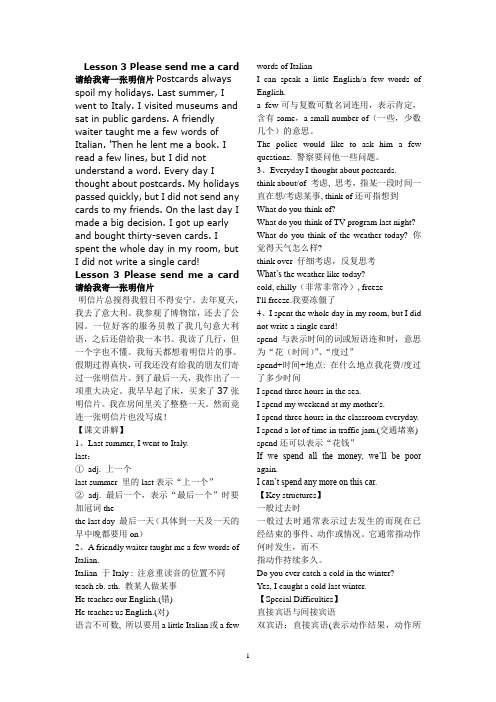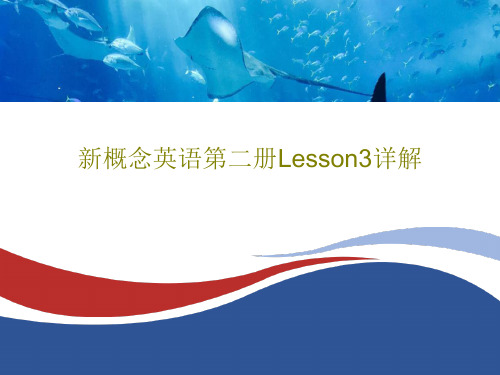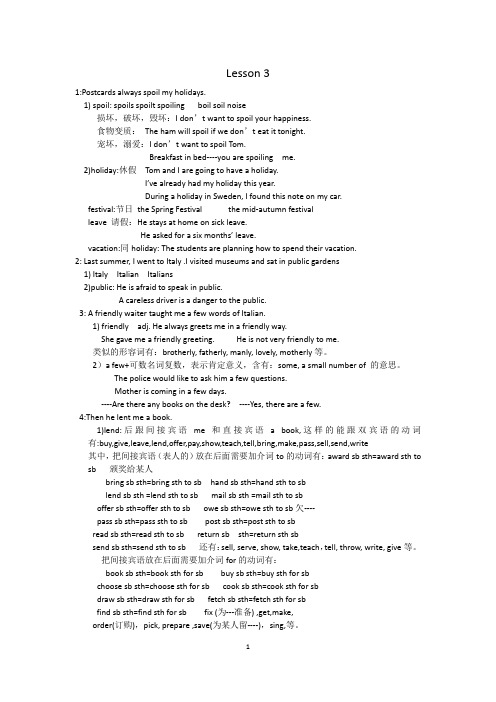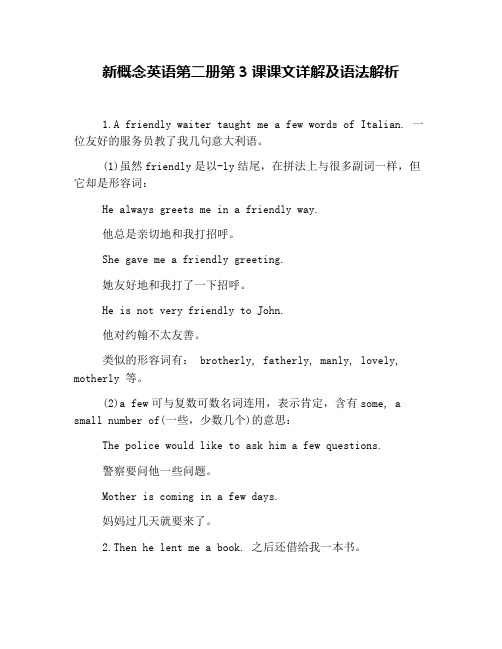新概念第二课第三课重点讲解
新概念英语第2册第3课重点语法句型

新概念英语第2册第3课重点语法句型第3课的内容:一、重要句型或语法1、时态复习一般过去时,表示过去发生的事情,如:The driver of that car hit that post over there.2、双宾动词1)双宾动词是指某些动词后面可以跟两个宾语,表物的为直接宾语,表人的为间接宾语。
2)注意区分双宾动词后间接宾语前用to还是for的区别,一般表示动作对某人而做用to,表示动作为某人而做用for。
如:He passed the salt to me. / She bought the tie for me.二、课文主要语言点Postcards always spoil my holidays. spoil在文中表示“破坏”,也可以表示“宠坏”,如:He is spoiled by his parents. 他被父母宠坏了。
Last summer, I went to Italy. last summer后面用了逗号,主要是为了突出作者去年暑假所做的事情。
注意Italy的读音。
I visited museums and sat in public gardens. 注意区分garden和park。
文中之所以用public来修饰garden,主要是因为garden一般是指私家房子前后院的花园,而park 一般是指供居民休闲的公共绿地。
A friendly waiter taught me a few words of Italian. friendly为形容词,其构词方式:名词+ly。
注意:“副词+ly”构成副词。
teach为双宾动词,所以其短语可改为:taught a few words of Italian to me。
注意Italian的读音。
Then he lent me a book. lend是双宾动词,一般用作:lend sb. sth.,也可以用作:lend sth. to sb.。
新概念英语二第三课

Lesson 3 Please send me a card 请给我寄一张明信片Postcards always spoil my holidays. Last summer, I went to Italy. I visited museums and sat in public gardens. A friendly waiter taught me a few words of Italian. 'Then he lent me a book. I read a few lines, but I did not understand a word. Every day I thought about postcards. My holidays passed quickly, but I did not send any cards to my friends. On the last day I made a big decision. I got up early and bought thirty-seven cards. I spent the whole day in my room, but I did not write a single card!Lesson 3 Please send me a card 请给我寄一张明信片明信片总搅得我假日不得安宁。
去年夏天,我去了意大利。
我参观了博物馆,还去了公园。
一位好客的服务员教了我几句意大利语,之后还借给我一本书。
我读了几行,但一个字也不懂。
我每天都想着明信片的事。
假期过得真快,可我还没有给我的朋友们寄过一张明信片。
到了最后一天,我作出了一项重大决定。
我早早起了床,买来了37张明信片。
我在房间里关了整整一天。
然而竟连一张明信片也没写成!【课文讲解】1、Last summer, I went to Italy.last:①adj. 上一个last summer 里的last表示“上一个”②adj. 最后一个,表示“最后一个”时要加冠词thethe last day 最后一天(具体到一天及一天的早中晚都要用on)2、A friendly waiter taught me a few words of Italian.Italian 于Italy : 注意重读音的位置不同teach sb. sth. 教某人做某事He teaches our English.(错)He teaches us English.(对)语言不可数, 所以要用a little Italian或a few words of ItalianI can speak a little English/a few words of English.a few可与复数可数名词连用,表示肯定,含有some,a small number of(一些,少数几个)的意思。
新概念英语第二册Lesson3详解共43页文档

16、人民应该为法律而战斗,就像为 了城墙 而战斗 一样。 ——赫 拉克利 特 17、人类对于不公正的行为加以指责 ,并非 因为他 们愿意 做出这 种行为 ,而是 惟恐自 己会成 为这种 行为的 牺牲者 。—— 柏拉图 18、制定法律法令,就是为了不让强 者做什 么事都 横行霸 道。— —奥维 德 19、法律是社会的习惯和思想的结晶 。—— 托·伍·威尔逊 20、人们嘴上挂着的法律,其真实含 义是财 在哪里。——西班牙
37、我们唯一不会改正的缺点是软弱。——拉罗什福科
xiexie! 38、我这个人走得很慢,但是我从不后退。——亚伯拉罕·林肯
39、勿问成功的秘诀为何,且尽全力做你应该做的事吧。——美华纳
40、学而不思则罔,思而不学则殆。——孔子
新概念第二课第三课重点讲解

Lesson 3 Please Send Me a Card【New words and expressions】生词和短语(11)send v. 寄,送postcard n. 明信片spoil v. 使索然无味,损坏museum n. 博物馆public adj. 公共的friendly adj. 友好的waiter n. 服务员,招待员lend v. 借给decision n. 决定whole adj. 整个的single adj. 唯一的,单一的★send v. 寄, 送send a letter 寄信send sth. to sb. /send sb. sth. 给某人送(寄)什么东西send/take children to school:take强调某人亲自送;send则是通过第三人去送, 如美国的校车take flowers to his wife 自己送send flowers to his wife 叫店里的人送★postcard n. 明信片两个爆破音在一起,前者失去爆破音。
这里/t/和/k/前者失去爆破音name card /visiting card 名片Here is my name card. (口语常用, 同时伴随着递出的动作) ID card 身份证(ID 身份)credit card 信用卡cash card 现金卡, 储蓄卡, 工资卡(不能透支的那种)★spoil(spoiled,spoilt) v. 使索然无味, 损坏①vt. 弄坏,损坏,糟蹋The sad news spoiled our weekend. 这不幸的消息使我们没能过好周末。
The rain spoiled the school sports. 这场雨把学校运动会弄得一团糟。
His arrival spoiled my holiday.②vt. 宠坏,惯坏,溺爱Don’t spoil your children. 不能太惯孩子。
新概念英语二第3课

Lesson 31:Postcards always spoil my holidays.1) spoil: spoils spoilt spoiling boil soil noise损坏,破坏,毁坏:I don’t want to spoil your happiness.食物变质:The ham will spoil if we don’t eat it tonight.宠坏,溺爱:I don’t want to spoil Tom.Breakfast in bed----you are spoiling me.2)holiday:休假Tom and I are going to have a holiday.I’ve already had my holiday this year.During a holiday in Sweden, I found this note on my car.festival:节日the Spring Festival the mid-autumn festivalleave 请假:He stays at home on sick leave.He asked for a six months’ leave.vacation:同holiday: The students are planning how to spend their vacation.2: Last summer, I went to Italy .I visited museums and sat in public gardens1) Italy Italian Italians2)public: He is afraid to speak in public.A careless driver is a danger to the public.3: A friendly waiter taught me a few words of Italian.1) friendly adj. He always greets me in a friendly way.She gave me a friendly greeting. He is not very friendly to me.类似的形容词有:brotherly, fatherly, manly, lovely, motherly等。
新概念二第3课

这里有文艺复兴的罗曼蒂克,也有喝不完的美酒 ,欣赏着世界
最顶级的艺术作品。
4. Traditional romance - Kyoto, Japan 传统浪漫之都——日本京都 [kiˈəutəu] 5. Bursting (adj. 满怀的;充满的) with romance
- Bruges, Belgium. [bru:ʒ] ['beldʒəm] 浪漫无极限——比利时布鲁日
It is always the same on these occasions. 每逢这种场合,情况都这样。 当用occasion表示在某个/些场合时,它与介词on 连用 on these occasion(s)每逢这种场合 the same 表示情况相同
“绿色少年”是一个流行歌曲演唱团。目前他们 正在全国各地巡回演出,明天就要到达此地。他 们将乘火车来,镇上的大部分青年人将到车站迎 接他们。明晚他们将在工人俱乐部演出。“绿色 少年”准备在此逗留5天。在此期间,他们将演出 5场。同往常一样,警察的日子不好过,他们将设 法维持秩序。每逢这种场合,情况都这样。
try to do sth. 设法做某事, 尽力做某事 in order 井井有条 out of order 乱七八糟 order sb to do sth 命令某人做某事 order a meal 点餐 order a book 订购一本书 order a new suit for oneself为自己订购一套西服
6. Passionate in pink - Jaipur, India 粉色倾城——印度斋蒲尔 [,dʒai'puə] 印度“粉城” (Pink City) 的浪漫令人难忘,尤以 其雄伟壮观的宫殿和清幽脱俗的寺庙为甚。
新概念英语第二册Lesson3详解

Please send me a card
Revision: Lesson2
• Words
• Text • Gra2
Grammar:一般现在时
1.构成:使用动词原形,第三人称单数须有变化。 (1)直接加“s”, works,takes
(2)以辅音加“y”结尾,变“y”为“i”,再加 “es”, carry → carries
(3)以“s, x, ch, sh,o”结尾的动词加“es”, goes dresses watches brushes
2.功能: 在句中的位 (1)表现在的事实、状态或动作:置 : 实 义 动 eg: Birds fly. 词之前,非 • She loves music. 实义动词之 Mary's parents get up very early. 后 • (2)表习惯性动作或职业,常与 often,sometimes,usually,always, every week,seldom,frequently 等时间副词连用。 • eg: I always take a walk after supper. She writes to me very often. Tom and his girlfriend go out to take a picnic occasionally.
take和send的区别:
1. take强调某人亲自送。 2. send则是通过第三人去送,如校车。
B.按时间表示将要发生的动作或事件,用一般 现在时表达将来时概念。 • • The play begins at 6:30 this evening. When does the plane take off? He leaves for that city next week. According to the timetable, the express train to Shanghai starts at nine in the morning. (按照时刻表,开往上海的特快列车早上 7 点 出发。) 同样用法的动词有:go,come,leave,arrive, land,meet,die,start,return,join…
新概念英语第二册第3课课文详解及语法解析

新概念英语第二册第3课课文详解及语法解析1.A friendly waiter taught me a few words of Italian. 一位友好的服务员教了我几句意大利语。
(1)虽然friendly是以-ly结尾,在拼法上与很多副词一样,但它却是形容词:He always greets me in a friendly way.他总是亲切地和我打招呼。
She gave me a friendly greeting.她友好地和我打了一下招呼。
He is not very friendly to John.他对约翰不太友善。
类似的形容词有: brotherly, fatherly, manly, lovely, motherly 等。
(2)a few可与复数可数名词连用,表示肯定,含有some, a small number of(一些,少数几个)的意思:The police would like to ask him a few questions.警察要问他一些问题。
Mother is coming in a few days.妈妈过几天就要来了。
2.Then he lent me a book. 之后还借给我一本书。
像send, buy, give等动词一样,lend能够有两个宾语:一个直接宾语(通常指物),一个间接宾语(通常指人)。
(cf. 本课语法)在这句话中,lend的直接宾语为a book,间接宾语为me。
Would you lend me your pen?能把你的笔借我用一下吗?Yesterday I lent my dictionary to Mary.昨天我把字典借给了玛丽。
3.…but I did not understand a word… 但我一个字也不懂。
not…a的否定意义比单用not要强。
课文的最后一句加了single,语气更强。
4.Every day I thought about postcards. 我每天都想着明信片的事。
- 1、下载文档前请自行甄别文档内容的完整性,平台不提供额外的编辑、内容补充、找答案等附加服务。
- 2、"仅部分预览"的文档,不可在线预览部分如存在完整性等问题,可反馈申请退款(可完整预览的文档不适用该条件!)。
- 3、如文档侵犯您的权益,请联系客服反馈,我们会尽快为您处理(人工客服工作时间:9:00-18:30)。
Lesson 3 Please Send Me a Card【New words and expressions】生词和短语(11)send v. 寄,送postcard n. 明信片spoil v. 使索然无味,损坏museum n. 博物馆public adj. 公共的friendly adj. 友好的waiter n. 服务员,招待员lend v. 借给decision n. 决定whole adj. 整个的★send v. 寄, 送send a letter 寄信send sth. to sb. /send sb. sth. 给某人送(寄)什么东西send/take children to school:take强调某人亲自送;send则是通过第三人去送, 如美国的校车take flowers to his wife 自己送send flowers to his wife 叫店里的人送★postcard n. 明信片两个爆破音在一起,前者失去爆破音。
这里/t/和/k/前者失去爆破音name card /visiting card 名片Here is my name card. (口语常用, 同时伴随着递出的动作) ID card 身份证(ID 身份)credit card 信用卡cash card 现金卡, 储蓄卡, 工资卡(不能透支的那种)★spoil(spoiled,spoilt) v. 使索然无味, 损坏①vt. 弄坏,损坏,糟蹋The sad news spoiled our weekend. 这不幸的消息使我们没能过好周末。
The rain spoiled the school sports. 这场雨把学校运动会弄得一团糟。
His arrival spoiled my holiday.②vt. 宠坏,惯坏,溺爱Don’t spoil your children. 不能太惯孩子。
His parents spoiled the boy.spoil: 把东西的质量变得不好; 生活中不顺心的事;宠坏, 溺爱break: 打破; break the windows 打破玻璃damage: 破坏, 程度不一定很重destroy : 破坏, 彻底摧毁以上三个是指物理上的破坏, 而spoil主要指精神上的★museum n. 博物馆Palace Museum 故宫★public adj. 公共的①adj. 公共的,公众的,社会的There is a public library in this town.②adj. 公开的,众人皆知的Their secret meeting was made public 20 years later. 他们的秘密会晤20 年以后才被公开。
public place 公共场所in public 公开的;in private 私下里的Let’s have a conversation in private. 让我们私下谈谈?Why not have a conversation in public? 为什么不公开谈呢?(当面说呢?)③n. 公众,群众,大众The public is/are pleased with his explanation. 公众对他的解释很满意。
The museum is open to the public on Sunday.★friendly adj. 友好的friendly是形容词,单独使用时一般做定语;作为状语表示这个人做什么事情很友好, 用短语in a friendly wayShe gave me a friendly greeting.He always greets me in a friendly way.以-ly结尾的形容词还有lovely,brotherly,fatherly,manly,motherly★waiter n. 服务员, 招待员waiter(男服务员), waitress(女服务员), 只出现在餐馆里chief waiter 领班I want to see the chief waiter. 我要见你们的领班。
shop assistant 商店里的店员attendant n. (其他公共场所的)服务员★lend v. 借给lend to(借出):lend sth. to sb/lend sb. sth.Can you lend me $20 please? I’ll pay/give it back tomorrow.borrow from(借进):borrow sth. from sb./borrow sth. (borrow 不能用borrow sb sth.)He borrowed my pen yesterday. He hasn’t given me it yet.★decision n. 决定make /take a decision 作出决定It was not easy for me to make/take this decision.make a big/great decision (big:重大;great:伟大, 更重大) decide v. 决定★whole adj. 整个的a whole bottle of milk 一整瓶牛奶the whole…,the whole day 整天,two whole weeks 整整两星期all the…,all the day (the可省略) 整天all the week整个星期all the money所有的钱all of后面如果加代词, 代词前面不需要修饰词;一旦要加名词, 前面一定要加theall of us;all of the students★single adj. 唯一的, 单一的反义词: double 双倍的【Text】明信片总搅得我假日不得安宁. 去年夏天, 我去了意大利. 我参观了博物馆, 还去了公园. 一位好客的服务员教了我几句意大利语, 之后还借给我一本书. 我读了几行, 但一个字也不懂. 我每天都想着明信片的事. 假期过得真快, 可我还没有给我的朋友们寄过一张明信片. 到了最后一天, 我作出了一项重大决定.我早早起了床, 买来了37 张明信片. 我在房间里关了整整一天. 然而竟连一张明信片也没写成!【课文讲解】1、Last summer, I went to Italy.last:①adj. 上一个last summer 里的last表示“上一个”②adj. 最后一个,表示“最后一个”时要加冠词thethe last day 最后一天(具体到一天及一天的早中晚都要用on)2、A friendly waiter taught me a few words of Italian.Italian 于Italy : 注意重读音的位置不同teach sb. sth. 教某人做某事He teaches our English.(错) He teaches us English.(对)语言不可数, 所以要用a little Italian或a few words of ItalianI can speak a little English/a few words of English.a few可与复数可数名词连用,表示肯定,含有some,a small number of(一些,少数几个)的意思。
The police would like to ask him a few questions. 警察要问他一些问题。
3、Everyday I thought about postcards.think about/of 考虑, 思考,指某一段时间一直在想/考虑某事, think of还可指想到What do you think of the weather today? 你觉得天气怎么样?think over 仔细考虑,反复思考think it over4、I spent the whole day in my room, but I did not write a single card!spend与表示时间的词或短语连和时,意思为“花(时间)”、“度过”spend+时间+地点: 在什么地点我花费/度过了多少时间I spend my weekend at my mother's.spend还可以表示“花钱”If we spend all the money, we’ll be poor again.【Key structures】一般过去时与一般现在时【Special Difficulties】直接宾语与间接宾语双宾语:直接宾语(表示动作结果,动作所涉及的事物)和间接宾语(动作目标,动作是谁做的或为谁做的,通常是人) 。
动词+间接宾语大多数情况下置于直接宾语之前,如果间接宾语在后,间接宾主前必须加“to”(表示动作对什么人做)或“for”(表示动作为什么人而做)。
give sb. sth./give sth to sb间接宾语在后面时, 其前必须加to(对……而言)或for(为……而做)。
可以翻译为“给”、“替”、“为”的,就用for;如果只能翻译为“给”的, 就用to与to相连的give, take, pass, read, sell, buy,pay,hand,bring,show,promise,offer,owetake flowers to my wife.与for 相连的buy, order, make, find,doI buy a book for you .make a cake for youfind sth. for sb.I do something for you.do sb. a favor 帮某人一个忙Do me a favor please./Do a favor for me? 帮我一个忙Can I order something for you? Can I buy you a bottle of beer ? 意为我请你喝杯酒的意思【Multiple choice questions】4 ___a___ him a few words of Italian? The waiter.a. Who taughtb. Who did teachc. What did he teachd. Whom did he teach人做主语提问——who 对宾语提问——whomwho既可以对主语提问也可以对宾语提问, 而whom只能对宾语提问如果对主语提问, 则句子的语序和陈述句语序一样;如果对非主语来提问, 则句子要使用特殊疑问词+ 一般疑问句的语序Who/Whom did the waiter teach a few words of Italian?5 He was a friendly waiter. He spoke to the writer ___d___ .a. friendb. as friendsc. like friendsd. in a friendly wayHe spoke to the writer like a friend.in...way :以...方式, 作为状语表示这个人做什么事情很友好, 用短语in a friendly way7 He spent the whole day in his room. He was in his room ___c___ day.a. the holeb. the allc. alld. all ofall (the) dayall of 后面如果加代词, 代词前面不需要修饰词all of us;一旦要加名词, 前面一定要加theall of the friends,all of my friends,all of the students10 On the last day he made a big decision. It was the ___a___ day of his holiday.a. finalb. endc. latestd. bottomfinal——形容词end——名词/动词latest——形容词bottom——名词latest adj. 最新的latest news;latest style 新款11 He made a big decision. He ___b___ .a. thought about itb. made up his mindc. changed his mindd. made a wishthink about:考虑、思考、想make up one's mind:下定决心change one's mind:改变主意make a wish : 许个心愿, 愿望, 许愿Key to KS ExercisesA went (1.1); visited (I.2); sat (I.2); taught (1.2); lent;read (1.3); did not understand; thought (1.4); passed (1.5); didnot send (1.5); made; got up (1.6); bought (1.7); spent (1.7); did not write (1.8)C ⋯Roy died last year ⋯ left me ⋯ spent a lot of money⋯bought one or two⋯ never went to the cinema ⋯ stayed at home ⋯listened to music ⋯ often lent CDs ⋯ they kept them ⋯ lost many CDs ⋯Key to SD Exercises1 He paid some money to the shopkeeper.2 He handed the prize to me.3 The waiter brought the man a bottle of beer.4 He sold me all his books.5 The shop assistant found me some curtain material.6 He did a big favour for me.7 She showed her new hat to her husband.8 She promised the finder a reward.9 He gave some advice to his son.10 His uncle left some money to/for him.11 He is teaching us English.12 I bought you this bunch of flowers.13 Bring me that book please.14 He offered a cigarette to me.15 Read the first paragraph to me.16 I've ordered you some soup.17 I owe a lot of money to him.18 Pass your father the mustard.Key to Multiple choice questions1 c2 a3 c4 a5 d6 b7 c8 c9 b 10 a 11 b 12 bKey to Sentence structureI did not send any cards to my friends.。
